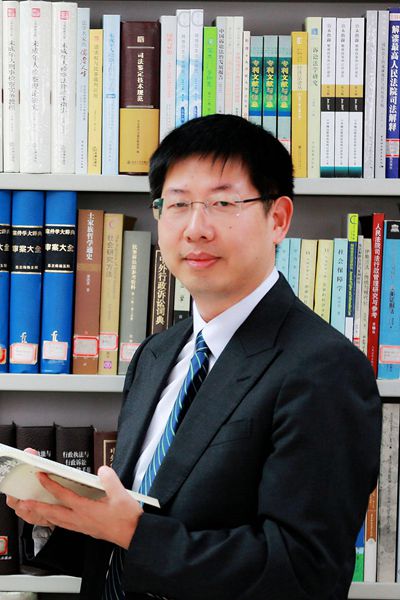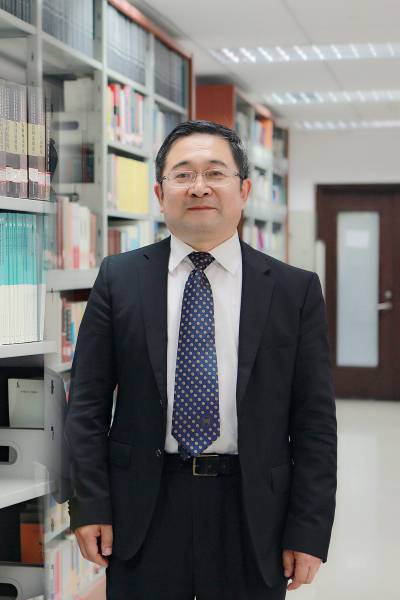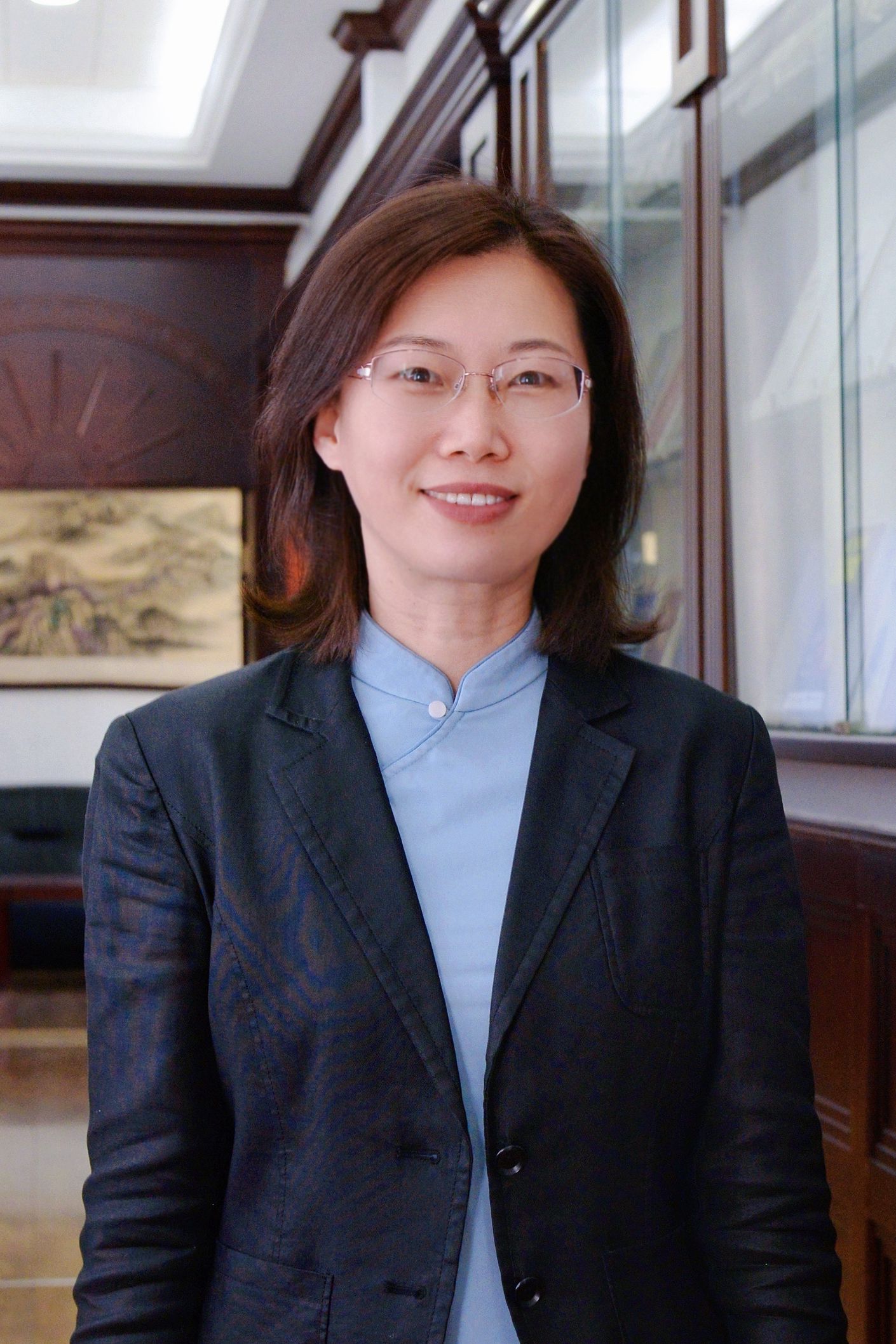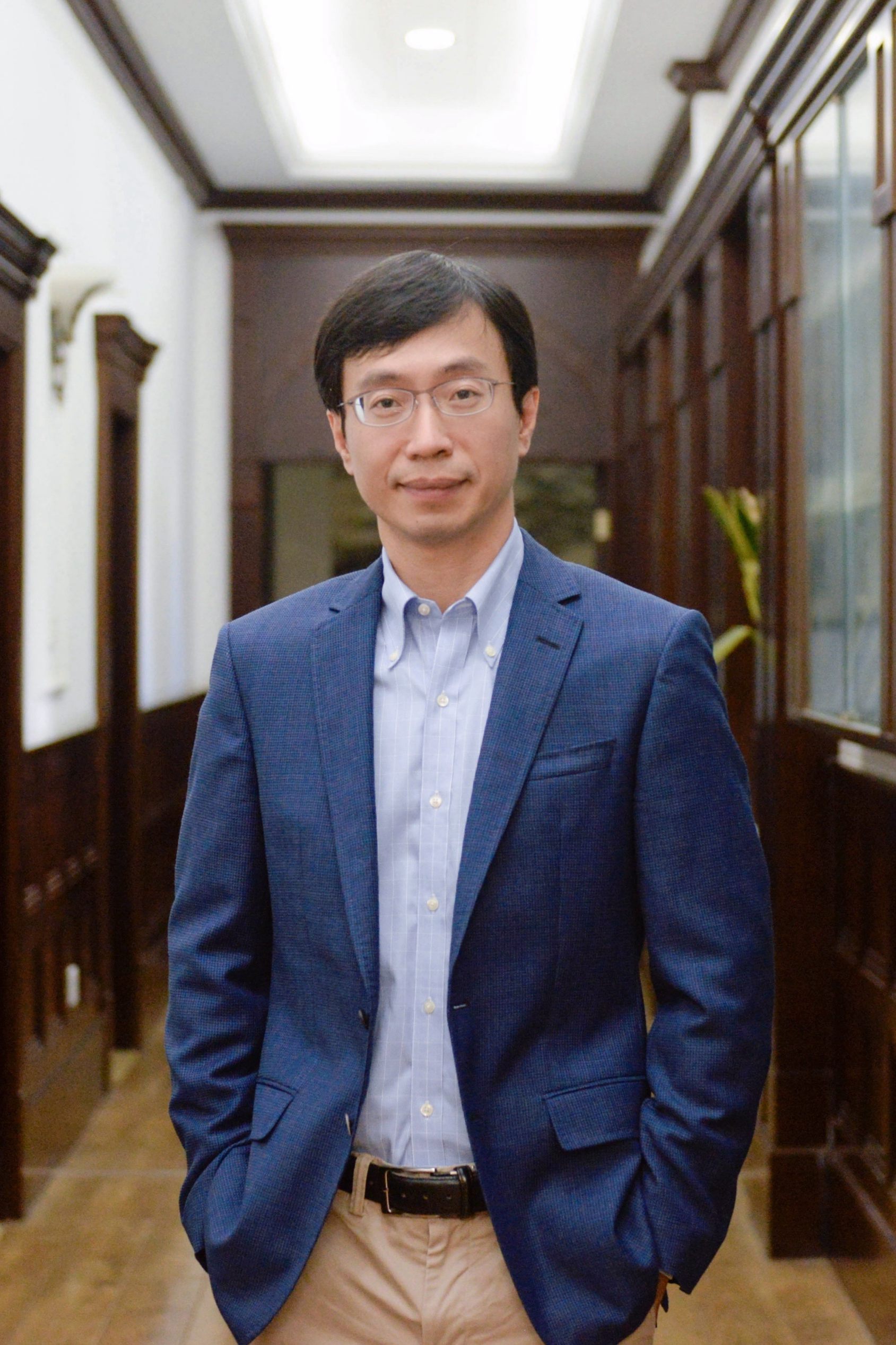The Institute of Law of the Chinese Academy of Social Sciences (hereinafter referred to as the Institute) is a research institution with an independent legal personality under the Chinese Academy of Social Sciences (CASS). It is mainly engaged in the research of issues with overall, strategic and forward-looking significance in the field of the rule of law and strives to play the role of a think tank of the Communist Party of China and the Chinese Government in decision-making on major issues of the rule of law construction. The Institute works under the leadership of the Joint Party Committee of CASS Institute of Law and CASS Institute of International Law and implements the director responsibility system under the leadership of the Joint Party Committee.
 Professor Li Honglei, Secretary of Joint Party Committee |
I. Historical Development
In 1958, at the proposal of Comrade Dong Biwu, a proletarian revolutionary of the older generation, the Institute of Law was formally established under the Department of Philosophy and Social Sciences of the Chinese Academy of Sciences, with Zhang Youyu, a deputy director of the Department, as its director. In 1977, the Institute changed its affiliation to CASS. After Zhang Youyu, the successive directors of the Institute were Sun Yaming, Wang Zhongfang, Wang Shuwen, Wang Jiafu, Liu Hainian, Xia Yong, Li Lin and Chen Su. The current director of the Institute is Mo Jihong. After the implementation of the director responsibility system under the leadership of the Party Committee, the successive Party secretaries of the Institute were Liu Han, Xin Chunying, Chen Su and Feng Jun. The current Party Secretary of the Institute is Chen Guoping.
II. Institutional Setup
Currently, the Institute consists of 14 research departments, including the departments of jurisprudence, legal history, constitutional and administrative law, civil law, commercial law, economic law, intellectual property law, criminal law, procedural law, social law, survey and study of national situation of the rule of Law, the rule of law strategy, ecological law, and cyber and information law, two editorial offices (the Editorial Office of Chinese Journal of Law and the Editorial Office of Global Law Review), one library, namely the Law Library of CASS, and three functional departments: the personnel department (Party committee office), the department of research coordination and international cooperation and the general office. Moreover, it manages one official website (www.iolaw.org.cn), one national academic society and ten non-entity research centers. In June 2021, the Think Tank for Comprehensive Law-based Governance was established under CASS by relying on the academic resources of the CASS Institute of Law and CASS Institute of International Law.
III. Research Achievements
Since its establishment, the Institute has published a large number of excellent works in the field of law and won many important awards, such as "Special Contribution Award for Outstanding Achievements in the Field of Legal Science in China in the 30 Years of Reform and Opening-up" given by China Law Society (the only one in China). These works played an important role in the construction of the rule of law and the development of law science at the time of their publication and still have great influence even today. Since the implementation of innovation projects, some research results made by scholars of the Institute under the innovation projects have been selected as the annual major innovation achievements of CASS. They include the Series of Research Reports on Comprehensively Promoting Law-based Governance, the Proposed Draft of the Chinese Civil Code with Reasons Attached, the Annual Report on the Development of the Rule of Law in China No.14 (2016), the Commentary on the General Principles of the Civil Law, the Commentary on the Civil Code, and the Chinese Rule of Law Reform. While continuously strengthening the research on basic theories of law, the Institute also attaches great importance to applied research such as empirical legal studies, and gives full play to its role as a high-end think tank in the field of rule of law. It has published nearly 60 blue books on the rule of law and more than 50 national think tank reports and submitted a large number of internal research reports to relevant government organs, which have played a positive role in the legislation and other decision-making of the country.
IV. Academic Periodicals
The academic periodicals (or collections of papers) published by the Institute include Chinese Journal of Law (bimonthly), Global Law Review (bimonthly), Chinese Journal of Legal History (the official journal of the Chinese Institute of Legal History), Research on Civil and Commercial Law (a core CSSCI collection of papers), Studies on Intellectual Property Rights, Chinese Journal of Empirical Legal Studies, and the Journal of Cyber and Information Law (the official journal of Cyber and Information Law Society under China Law Society). Besides, the Institute also publishes annual reports on the development of the rule of law, including the book series Blue Book on the Rule of Law in China.
V. International Exchanges
The Institute has extensive academic exchange and cooperation with legal research institutions in many countries and regions around the world and, as such, has a high international reputation. It maintains long-term friendly and cooperative relations with world-renowned law schools and legal research institutions such as Yale Law School and Columbia Law School in US, the Law School of Montreal University in Canada, the Law School of Helsinki University in Finland, the Max Planck Institute for Foreign Private and Private International Law in Germany, the Institute of Comparative Law of Waseda University in Japan, the Institute of Legislation and Comparative Law under the Government of the Russian Federation, and the Law School of Warsaw University in Poland. It accepts foreign visiting scholars and holds regular or irregular international academic seminars attended by internationally renowned scholars. Experts and scholars of the Institute have published a large number of legal works and papers abroad.
VI. Talent Training
The Institute attaches great importance to the training of legal talents. It began to admit master's students in law in 1978, obtained the right to grant doctoral degrees in law in 1991, set up a postdoctoral mobile station in 1992, obtained the right to grant doctoral degrees in first-level disciplines of law and doctoral degrees and master’s degrees in all second-level disciplines of law in 2003, and began to offer the JM program in 2004. In 2020, under the mode of "integration of research and education", it established a law school in cooperation with the University of Chinese Academy of Social Sciences with Professor Chen Su and Professor Mo Jihong successively serving as the dean of the law school.
Among the scholars of the Institute, seven have been elected CASS members, seven have been elected as honorary CASS members, 80 have enjoyed special government allowances from the State Council, six have been selected for the “project of cultivating hundreds of world-class scientists, engineering experts and theorists, thousands of national academic and technical leaders, and tens of thousands of backbone young talents”, and seven have served or are currently serving as members of the Standing Committee of the National People's Congress, deputies to the National People’s Congress or members of Chinese People's Political Consultative Conference, eight have been awarded the title of "Top Ten Outstanding Young Jurists in China" by China Law Society, and many hold leadership positions in national or international academic societies. At present, nearly 30 scholars from the Institute are council members or hold higher positions in China Law Society, or are executive council members or hold higher positions in various research societies under China Law Society, one is the honorary chairman of the International Association of Constitutional Law and one is a vice chairman of Chinese Branch of International Association of Penal Law.
VII. Outstanding Contributions
At the early stage of reform and opening up, the Institute organized the demonstration of important theoretical viewpoints and principles of the rule of law, such as "all people being equal before law", "adhering to the rule of law and opposing the rule of man", "building socialist democracy and legal system" and "building a socialist system of law", all of which played a positive guiding role in emancipating the mind and bringing order out of chaos at that period of time. Professors Wang Jiafu, Li Buyun and Liu Hainian also participated in the drafting of the Instructions of the Central Committee of the Communist Party of China on Ensuring the Effective Implementation of the Criminal Law and the Criminal Procedure Law (Document No.64 [1979], CPC Central Committee). The document, promulgated in September 1979, is of milestone significance in the history of the rule of law construction in China.
In December 1982, the National People's Congress promulgated the new Constitution. In the process of drafting this new constitution, the CPC Central Committee decided to set up a Constitution Revision Commission under the National People's Congress to preside over the work. A secretariat was set up under the Constitution Revision Commission to be responsible for the concrete work of constitutional revision with Hu Qiaomu as the secretary-general and Zhang Youyu as one of the deputy secretaries-general. Professor Wang Shuwen, then the head of the State Law Department of the Institute, participated in relevant work as an expert in constitutional law. Before and after the promulgation of the new Constitution, the researchers of the Institute published a series of influential theoretical and publicity articles on the new Constitution.
In 1986, Professors Wang Jiafu, Zheng Chengsi and Liang Huixing led the researchers of the Institute to participate in the drafting and demonstration of the General Principles of Civil Law, which was passed by the National People's Congress in April 1986. Since the reform and opening up, experts and scholars from the Institute have participated in the drafting, revision, demonstration and deliberation of more than 400 laws and administrative regulations.
In the early 1990s, the Institute took the lead in China in carrying out research on human rights theory and related countermeasures and established the CASS Center for Human Rights Studies. Many scholars of the Institute participated in the drafting of China’s first white paper on human rights - Human Rights in China - which was issued by the Information Office of the State Council in 1991, and actively took part in international human rights dialogues and exchanges, thereby making important contributions to the development of the human rights cause in China.
The National People's Congress passed the Basic Law of the Hong Kong Special Administrative Region in April 1990 and the Basic Law of the Macao Special Administrative Region in March 1993. Professor Wu Jianfan, as a member of the drafting committees of two basic laws and a member of the Preparatory Committee of the Hong Kong Special Administrative Region, participated in the whole process of drafting the two basic laws.
In September 1990, the Copyright Law was adopted by the Standing Committee of the National People's Congress. As a member of the Drafting Group of the Law, Professor Zheng Chengsi participated in the whole drafting process of the Law. Before and after this, he also participated in the revision of the Patent Law and the Trademark Law and the drafting of the Anti-unfair Competition Law, as well as in the Sino-US intellectual property negotiations as a legal adviser and expert. He was invited to give lectures at the collective study sessions of the Political Bureau of the CPC Central Committee in July 2001 and May 2006.
After China established the socialist market economic system in 1992, the Institute took the lead in demonstrating the construction concept, basic principles and the main structure of "the legal system of the socialist market economy", and put forward suggestions on the plan for the construction of the system.
In March 1999, the Contract Law was adopted by the National People's Congress. At the beginning of the drafting of the Law, the Institute was entrusted by the Legislative Affairs Commission of the National People's Congress to prepare expert opinions on the draft law (a total of 12 academic institutions in China submitted expert opinions on the draft law) and Professor Liang Huixing and other experts from the Institute played an important role in the drafting of the Law. Later, Professor Liang Huixing and other scholars from the Institute also participated in the drafting of important civil laws such as the Property Law and the Tort Law.
In March 1999, the National People's Congress adopted a constitutional amendment, which explicitly stipulates that "the People's Republic of China practices law-based governance and builds a socialist country under the rule of law". Previously in 1996, Professor Wang Jiafu, then the director of the Institute of Law, put forward the strategic proposal of "governing the country in accordance with law and building a socialist country under the rule of law" in one of his lectures on the legal system given in Zhongnanhai, which was adopted by the CPC Central Committee.
On December 18, 2018, the CPC Central Committee and the State Council gave Professor Wang Jiafu the title and the medal of “the Pioneer of Reform”. Professor Wang Jiafu was also given the title of “Theoretical Innovator Who Has Promoted the Development of the Rule of Law in China”.
In May 2020, the Civil Code was adopted by the National People's Congress. Several generations of scholars of the Institute participated and played an active role in the drafting of the Civil Code. As early as 1978, Professor Wang Jiafu submitted at the request of Mr. Hu Qiaomu a proposal on formulating the Civil Code to the CPC Central Committee. The CPC Central Committee instructed the Legislative Affairs Commission of the National People's Congress and the Institute of Law to jointly prepare a trial draft of the Civil Code, which had played a very important preparatory role in the future civil legislation. Later, many researchers from the Institute participated in and made outstanding contributions to the compilation of the Civil Code. In 2021, the Civil Law Department of the Institute was given the title "the National Advanced Collective of Professional and Technical Personnel".
The Institute has shown its continuous academic influence in the decision-making of the state in the field of the rule of law. Since 1995, researchers from the Institute have been invited as keynote speakers at five study sessions on the legal system in Zhongnanhai, four study sessions on the legal system of the Political Bureau of the CPC Central Committee, ten study sessions on the legal system of the Standing Committee of the National People's Congress, and one study sessions on the legal system of the Standing Committee of the National Committee of the Chinese People's Political Consultative Conference.
Related Links:
Introduction to the Institute of Law of Chinese Academy of Social Sciences(2022)
Introduction to the Institute of Law of Chinese Academy of Social Sciences(2021)






